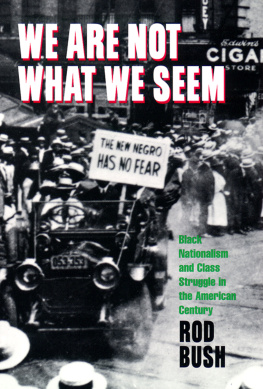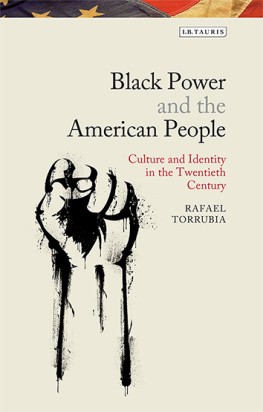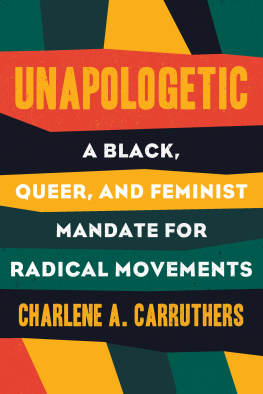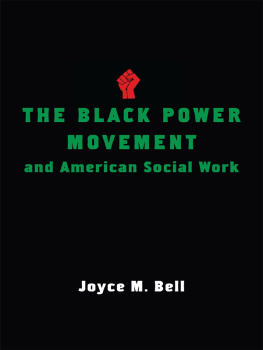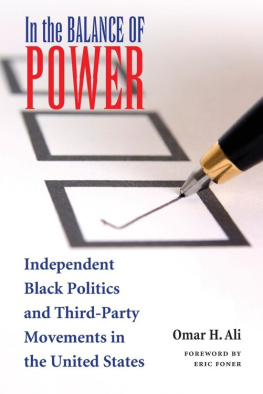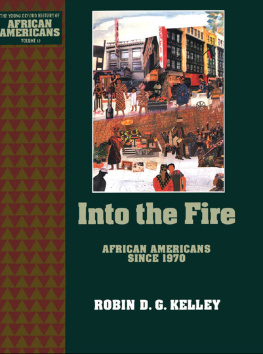Thank you for buying this ebook, published by NYU Press.
Sign up for our e-newsletters to receive information about forthcoming books, special discounts, and more!
Sign Up!
About NYU Press
A publisher of original scholarship since its founding in 1916, New York University Press Produces more than 100 new books each year, with a backlist of 3,000 titles in print. Working across the humanities and social sciences, NYU Press has award-winning lists in sociology, law, cultural and American studies, religion, American history, anthropology, politics, criminology, media and communication, literary studies, and psychology.
We Are Not What We Seem
NEW YORK UNIVERSITY PRESS
New York and London
Copyright 1999 by New York University
All rights reserved
Library of Congress Cataloging-in-Publication Data
Bush, Roderick D., 1945
We are not what we seem : Black nationalism and class struggle in
the American century / Roderick D. Bush
p. cm.
Includes bibliographical references and index.
ISBN 0-8147-1317-3 (cloth : alk. paper)
1. Afro-AmericansCivil rightsHistory20th century. 2. Black
nationalismUnited StatesHistory20th century. 3. Afro-Americans
Politics and government. 4. Social classesUnited StatesHistory
20th century. 5. United StatesRace relations. I. Title.
E185.61.B98 1998
305.896073ddc21 98-25483
CIP
New York University Press books are printed on acid-free paper,
and their binding materials are chosen for strength and durability.
Manufactured in the United States of America
10 9 8 7 6 5 4 3 2 1
Acknowledgments
I often felt lonely and isolated while working on this project over the last ten years, but the very attempt to communicate reinforces the profoundly social aspect of this experience. This act of communication draws upon a dizzying array of mentors, enablers, and supporters without which this effort would not have been possible. This number is much larger than I can mention here, but I would like to express my love and gratitude to some of the key people.
This work is dedicated to my family and to a beloved mentor who passed away last January. Terence K. Hopkins was a friend, mentor, and role model as a scholar, a writer, a teacher, and a human being. He always gave more than seemed humanly possible to any task. He worked diligently, tirelessly, and unremittingly with me to state my ideas clearly and fully, forcefully and carefully. We talked for hours and hours about the movements, the world-economy, and the need to understand the processes of the capitalist world-economy. We made plans to do joint work once this project was done. He made a profound mark upon those whom he advised, but the world does not know the intellectual impact of this man because he worked mostly through advising and teaching others, even his peers.
The first circle of support comes from my wife, my children, and my parents. First and foremost is my wife, my soulmate, and comrade, Melanie Bush. As a mentor and critic, as an intellectual companion without compare, she has been a singular inspiration. From our first meeting and eventual collaboration as militants, she has always been my role model. Her tireless energy and devotion to unselfish service and mentorship is a constant reminder of how humane we can all strive to be. Her personal and intellectual integrity and depth daily enriches my life and my scholarship. Over the course of this project she gave birth to our love child, Sarafina Fidelia, completed her own M.P.H. and completed the course work for a Ph.D. in anthropology. While doing all of this she helped me to keep my eyes on the prize, reaffirmed our common values (humility, the mass line), and gave unselfishly of her own insights on many issues germane to this project.
All of my children in their own way provided invaluable support. Although my youngest, Sarafina, was born during this process, she has grown up and has increasingly provided moral and emotional support, and clearly reflects the values that we espouse. Malik, my oldest, is a constant intellectual companion willing to talk for hours about the movement, its objectives, and how a new generation could make its own mark upon the world. Thembi, my oldest daughter, is loving and responsible and capable. She keeps up with everyone, makes sure they are all right. She makes sure that I am doing what I am supposed to be doing. Sojourner, my middle daughter, has much of the adventurous spirit, the daring, and the rebelliousness that kept me in trouble. They are all a source of joy, inspiration, and support.
I would also like to express my deepest appreciation to my mother, Margaret J. Bush, a source of emotional and spiritual support for all of these fifty-two years, and who always encouraged me to follow my dream. I am also indebted to her for my strong commitment to being my brothers keeper, and for my strong opposition to all forms of injustice. In this category there are, of course, many others, but most notably my grandmother, Arbesto Johnson (Barkoo), and my Aunt Honey (Margie Whipper) both of whom taught me more than I can ever remember. I should also say a word of thanks to my father, David Bush Jr., who encouraged me and was always willing to listen to me, no matter how wild my ideas seemed, especially in the 1960s and 1970s. He died in 1981, his body wracked with pain from overwork at the local automobile factory.
Now I turn to my intellectual debt.
I am very grateful to Immanuel Wallerstein who encouraged me to return to school, and indeed whose work inspired me to go back to school at such a late stage in my life. Immanuel is not only one of the greatest scholars of our time, but also a kind and decent human being who truly believes in the democratic and egalitarian ideas that he writes about. He always took time out of his very busy schedule to consult with me about whatever. I am also indebted to Andrew Chip Maxwell, Dale Tomich, and Darryl Thomas my professors at the State University of New York at Binghamton who were always there when I needed them.
I would like to express my appreciation to a few of the people to whom I owe a special intellectual debt and who served as role models for me. Again these are too many to mention, but certain ones demand special recognition: Abdul Alkalimat and Bill Sales for their contributions to Black Studies and the Black Liberation Movement; Robin D. G. Kelley for his exemplary scholarship steeped in the egalitarian traditions of our foremothers and forefathers, for broadening the scope of our vision, and for being an extraordinary human being who gives unselfishly of time, advice, and support; James and Grace Boggs for the political education that they have provided for my generation and for others as well; Frances Fox Piven, whose Poor Peoples Movements (with Richard Cloward) served as a model for this project and who helped me clarify my views at an early stage in the project; Cedric Robinson, whose Black Marxism is the most exemplary chronicle of the Black radical tradition; W. E. B. Du Bois, whose insights for nearly a century have made an inestimable contribution to our understanding of the capitalist world-system and the place of people of color in it; Samir Amin, whose work first introduced me to the world-systems perspective; Giovanni Arrighi, whose work on capitalism and the working class has very much informed my work; Stephen Steinberg, whose work on racial inequality is without peer; Amiri Baraka, who always says what he means, yet tirelessly counsels that we unite and not split, a model of intellectual integrity and revolutionary commitment; Arcee James, who taught me very early in life the importance of independent and critical thought; Stanley Levine, who in endless discussions has taught me much about the traps of ideological rigidity; Omali Yeshitela, whose writings and leadership have been very important in maintaining the continuity of one section of the Black Liberation Movement; Mickey Dean, whose friendship and mentorship have been very important in my development; James Ogunusi, whose generous spirit has been a constant inspiration to me over the past few years and who fed me endless articles to help me with this project; and Yusuf Nuruddin, who has made me aware of a number of documents which deepened my comprehension of this area of scholarship.

